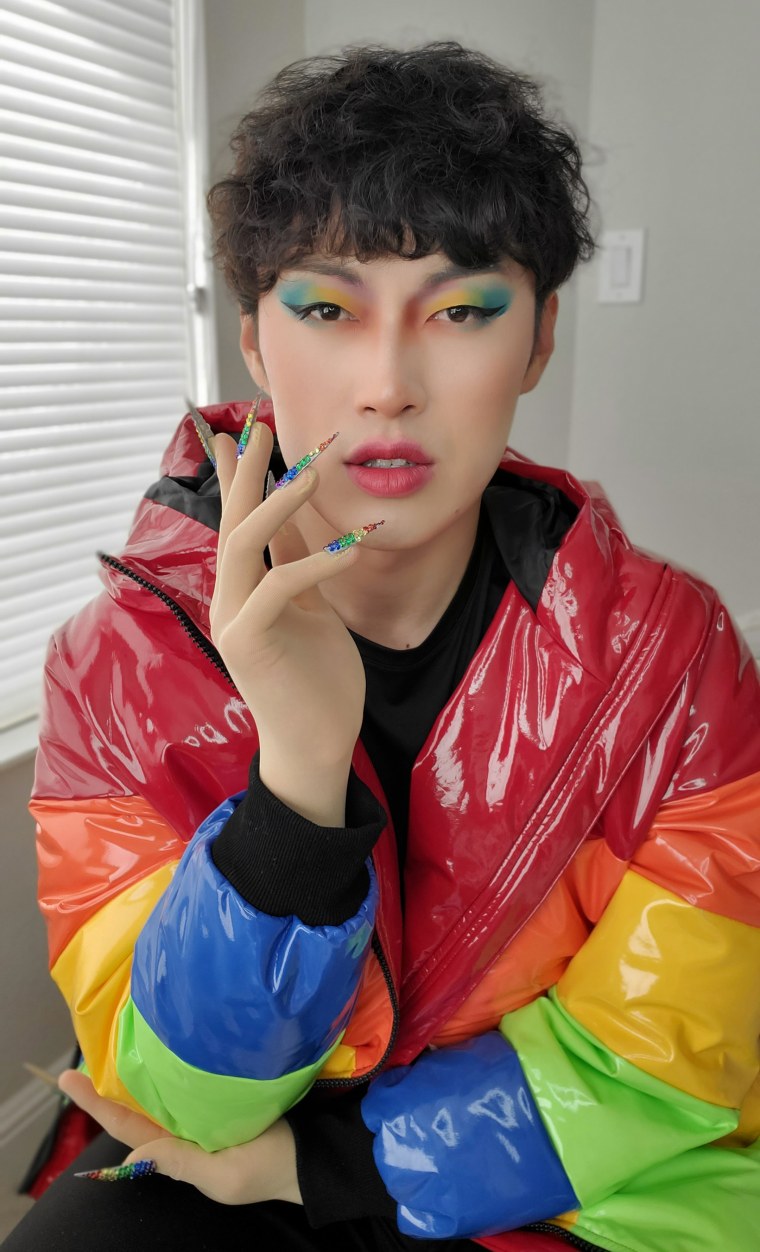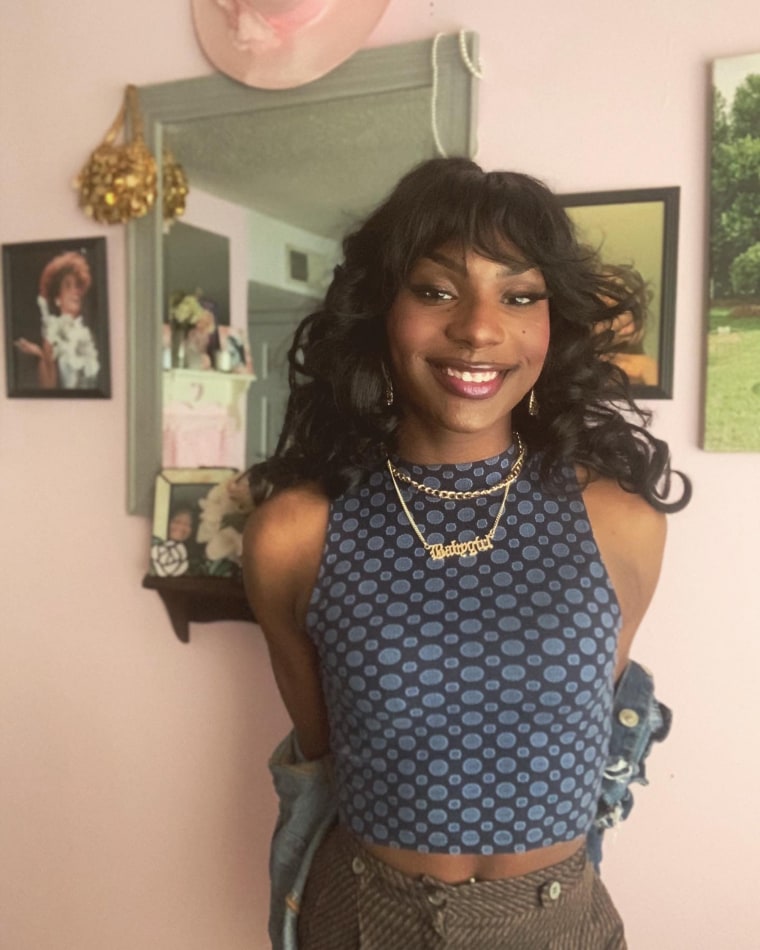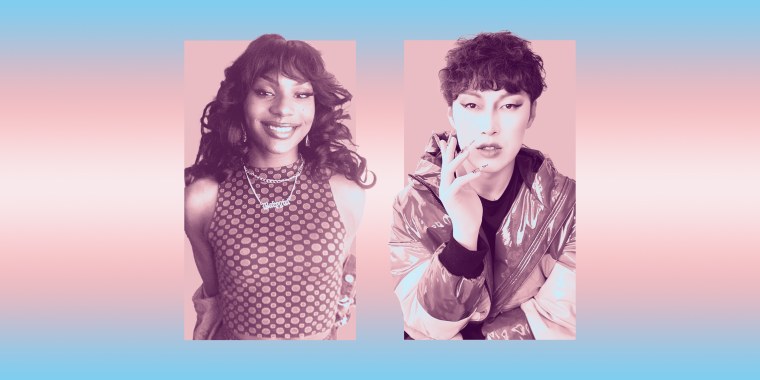TikTok is no longer just an app to see the latest viral dance craze or watch funny skits. Creators are using the platform to put social issues and activism in the palms of thousands of users’ hands daily with the hopes of changing hearts and minds — and many are growing a sizable audience in the process.
TikTok became the most downloaded app of 2020 when the coronavirus pandemic forced most of the world to stay home in March 2020. That’s also when makeup artist Mother Victory began posting videos on the platform.
“I joined TikTok in late 2019, but I really started to post videos after I was laid off from my job at the beginning of the pandemic,” Mother Victory told TMRW. “I started out posting videos showcasing Disney villain-inspired makeup and drag looks, but drag can be very expensive and time consuming, so I started to incorporate more educational and authentic content and began sharing more about my personal identity to mix it up.”
As Mother Victory’s audience grew, they noticed the comment section under their videos begin to fill up with comments and questions — some sincere and some snarky — about their queer identity. So, the San Francisco native, who identifies as gay and nonbinary, decided to create comical content and teachable moments based on the commentary. And in less than a year, they amassed more than 1.5 million followers.
“Too often in mainstream media — even LGBTQ media — you don’t see people who look like me,” said Victory, who is Chinese and Vietnamese. “As an Asian person and an Asian queer person at that, I often experience a lot of racism on top of homophobia and sometimes feel like I’m at the bottom of the barrel. But what I love about having a platform and growing an audience, is that I feel empowered to do my best to raise awareness and educate people about the intersectional issues affecting people like me, and that information is coming directly from someone who is an Asian, gay, nonbinary person.”

Jaye Kim, a 16-year-old living in Orlando, Florida, said watching Mother Victory (who uses the pronouns they/them and she/her) gives them the confidence to be themselves.
“I’m Asian and I am nonbinary, so I never see people like me on TV or in movies or anything,” Kim told TMRW. “Mother Victory is so funny and bold and just not afraid to put herself out there. Seeing her videos made me have more self-confidence, and looking at how many followers she has makes me feel I can be myself and be accepted, too.”
In addition to trying to help the world be a more inclusive and accepting place, Victory says they are most proud of helping young LGBTQ people accept themselves.
“I get messages from people all over the world who are recently out of the closet or struggling with their identities thanking me for my videos, saying that my videos about coming out or confidence has helped them navigate their own lives,” Victory said. “I’m proud that me being myself, showing up, taking up space and letting people know we exist will slowly change culture.”
TikTok creator Jade Marie Eichelberger uses her platform to create videos that focus on issues affecting the lives of transgender people, specifically trans women of color.
“I see myself as an educator,” Eichelberger told TMRW. “As a Black, trans woman from the Bible Belt South, no one is defending people like me or talking about issues affecting the day-to-day lives of people like me, so I use my platform to inform and inspire.”

Eichelberger joined TikTok last year to pass time during the pandemic and watch funny videos. But when the 19-year-old from Columbia, South Carolina, stumbled on a video challenging TikTokers to explain how the U.S. public education system failed them, she used it as an opportunity to share a dehumanizing encounter she experienced when a high school guidance counselor refused to use her name and pronouns, and proceeded to berate her in front of other students.
The video went viral, garnering more than 1.5 million views, more than 600,000 likes and helping Eichelberger earn the nearly 162,000 followers she boasts today.
“I received so many comments from other young trans and queer people who appreciated me using my voice to bring attention to how so many educators are not equipped to encourage and create safe spaces in learning environments,” Eichelberger said. “After that video, I started to create more videos about my experiences and the underreported issues that affect trans lives. Me sharing my stories, stories about when I no longer wanted to be alive, people have told me that watching my videos, I’ve saved them.”
Eichelberger says she uses her videos to spotlight the intersectional issues she feels aren’t discussed enough in mainstream media, including how the lives of trans women fit into conversations around feminism and LGBTQ rights and how problems affecting Black trans women fits into the Black Lives Matter movement.
“One of the biggest things I’ve covered on my page is exploring how there is privilege in everything,” she said. “For example, it’s a privilege to be able to even celebrate Pride. In many parts of our country, Pride celebrations aren’t a thing. Not everyone can walk out of their house and feel free and safe. Of the many tragic and senseless murders of trans women this year, the majority were people of color. Black and brown lives are at risk. Our stories need and deserve to be included in the conversations about equality — women’s, LGBTQ or Black — and its privilege when leaders of those movements leave us out of those conversations.”
Joy Brown, a 17-year-old living in Tulsa, Oklahoma, says transgender creators on the app help her feel less alone as a trans teen herself.
“Being able to open up TikTok any time of day and see hundreds of videos made by transgender creators literally keeps me going some days,” Brown told TMRW. “Most of the stuff we see about trans people is the bad, the trauma, the deaths, but being able to see trans people as parents, dancing, singing or just doing their makeup like any other girl tells me trans people are misrepresented and it gives me more hope for my future.”
Feeling misrepresented and marginalized inspired designer Geronimo Louie to create videos on TikTok. As a two-spirit or Indigenous queer from the Chiricahua Apache band and the Navajo Nation, Louie uses his account to uplift Indigenous people and educate viewers about how systemic racism, colonization and cultural appropriation has contributed to the erasure of his people.
“I joined TikTok in late 2019 to watch silly, funny videos,” Louie told TMRW. “Then, I started to notice I didn’t see many other Indigenous people on the app.”
Louie said the lack of Indigenous creators inspired him to pick up his phone and share videos about his himself, his heritage and his Indigenous queer identity.
“A lot of people gravitated toward the videos,” Louie said. “I received support from Indigenous people and others who were interested in learning, so I took it upon myself to speak (and) share more about our culture to make people more aware of Indigenous peoples’ issues with the hope that people will be more sensitive.”
Louie hopes his visibility will also encourage more inclusion within the LGBTQ community.
“Even though it was Black and Latinx trans women who started the LGBTQ uprising, over time, it’s become a celebration that seems to predominately focus on white, gay men,” Louie said. “It’s important to remember how this activism started. As an Indigenous person, colonization required us to fight to say we belong and advocacy work became part of our culture. So I proudly stand with other marginalized people of color in banding together to address the issues and policies preventing us from prospering.”
Eichelberger hopes her visibility on TikTok — and the increased visibility of other underrepresented people on the app — will encourage others to find their voice.
“I believe we go through experiences to help others,” she said. “If by me showing up and telling my story is helping someone else, then I hope that person tells their story, too. We deserve to be seen and heard and our stories matter.”
Related:


